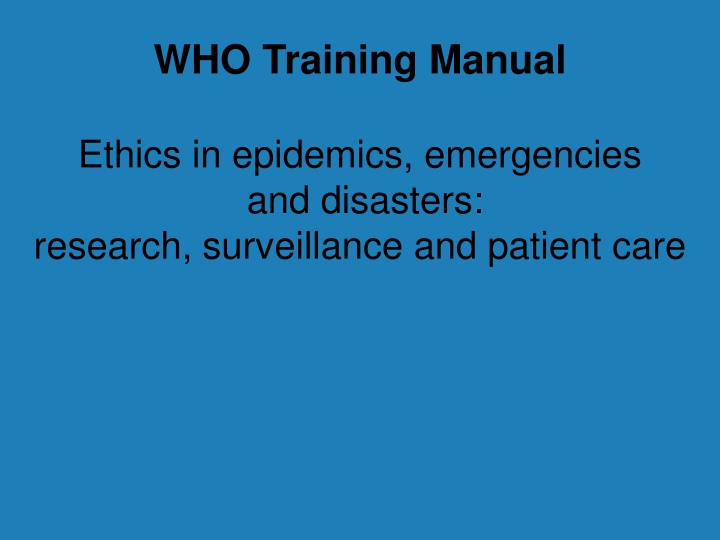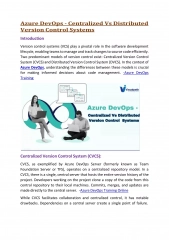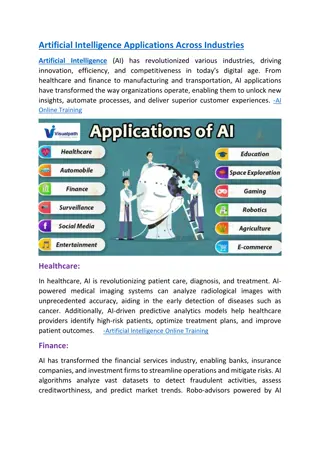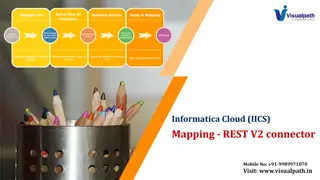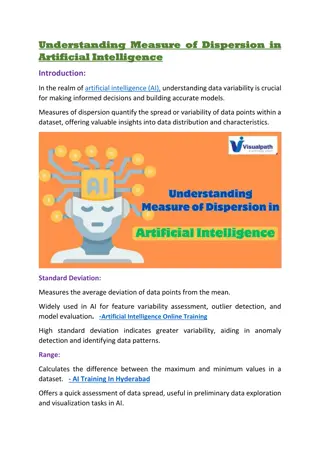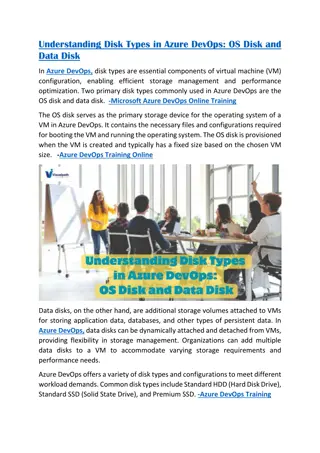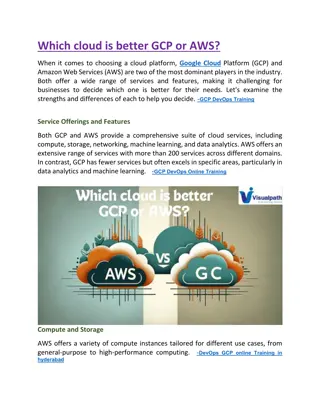WHO Training Manual
This manual delves into the ethical considerations surrounding epidemics, emergencies, and disasters, focusing on research methods, surveillance practices, and patient care protocols. It provides valuable insights into navigating ethical challenges in high-stress situations and offers guidance for maintaining moral integrity in the face of crises.
Download Presentation

Please find below an Image/Link to download the presentation.
The content on the website is provided AS IS for your information and personal use only. It may not be sold, licensed, or shared on other websites without obtaining consent from the author.If you encounter any issues during the download, it is possible that the publisher has removed the file from their server.
You are allowed to download the files provided on this website for personal or commercial use, subject to the condition that they are used lawfully. All files are the property of their respective owners.
The content on the website is provided AS IS for your information and personal use only. It may not be sold, licensed, or shared on other websites without obtaining consent from the author.
E N D
Presentation Transcript
WHO Training Manual Ethics in epidemics, emergencies and disasters: research, surveillance and patient care
Core competence 3 Ability to identify conflict between the common good and individual autonomy in surveillance during emergency response
Corresponding learning objectives Identify possible harm and benefit to individuals and communities resulting from public health practice and surveillance. Assess the factors to be considered in determining when public health surveillance requires explicit informed consent from individuals or communities. Evaluate the measures required to protect privacy and confidentiality in an emergency. Describe specific measures required to protect and collect data and biological materials during public health surveillance. Describe circumstances in which the common good might overrule individual autonomy during public health surveillance. L.O. 1.1
Potential harms and benefits resulting from public health practice and surveillance Potential benefits Better health for individuals Better health for communities More efficient use of health resources More scientific opportunities Potential harms Potential harm of public health practice and surveillance Adverse effects Loss of privacy and/or confidentiality Stigmatization Rights violation Wasteful use of limited resources L.O. 1.1
Conflicts arising Harm must be balanced against potential benefits Individual good must be weighed against public good However, the relative weight given to each harm and benefit depends on the context and on moral and cultural beliefs Community should be involved in decision making Minimization of harm (minimum amount of the data; engaging early with individuals, families or communities; using rigorous data protection procedures; acting on new evidence as quickly as possible etc.) L.O. 1.1
Informed Consent The right to decide whether or not to accept a particular intervention after being fully informed of the risks, benefits, and alternatives. Both a legal and ethical principle Does not necessarily have to be in writing Justifications Individual autonomy Engages individuals in the process, thereby promoting better outcomes L.O. 1.1
When Is Informed Consent Required? Clinical care For minor interventions, consent can be implied or presumed For more significant interventions, a specific consent process is necessary Medical research Most research interventions require formal written consent In some cases, consent can be oral Consent can be waived if the risks are minimal and the research otherwise could not be conducted, or in other limited circumstances L.O. 1.1
Informed Consent and Surveillance: Current Practices Typically, informed consent is not obtained in surveillance activities Common rationales: Surveillance is conducted by government officials pursuant to legal obligations Individuals often do not have the right to refuse, so there is no reason to ask permission Risks are often seen as minimal Some surveillance activities still warrant individual consent (high risk, no treatment available, trust etc.) L.O. 1.1
Community consultation Consulting community leaders before start of the activity Especially if the primary risks of the activity extend to communities as a whole rather than to individual members E.g. high risk of associating a particular ethnic group with an undesirable genetic mutation L.O. 1.1
Privacy & Confidentiality Privacy Right or expectation not to be interfered with To be free from surveillance, or a moral right to be left alone Privacy is for instance concerned with the setting in which the person s health-related information is acquired. Confidentiality Principle that ensures that identifiable information is kept out of reach of others All identifiable information about individuals, whether recorded (written, computerized, visual, audio) or simply held in the memory of health professionals, is subject to the duty of confidentiality L.O. 1.1
Privacy & Confidentiality Privacy is concerned with the circumstances under which a person s health-related information is collected (e.g. interviewing someone to fill a questionnaire) Confidentiality is concerned with the collected information itself (e.g. the filled questionnaires) Hence, the duty of confidentiality includes all identifiable health-related personal information, whether written, computerised, visual, audio, or simply memorised by health professionals. L.O. 1.1
General Measures to respect Privacy and Confidentiality Avoid collecting unnecessary identifiable information. Use coding to refer to respondents. Limit access to data based on a clear understanding of roles and information needed to complete an assignment. Do not discuss an individual s personal data with unauthorized personnel. Be explicit about the circumstances under which identifiers might need to be disclosed (e.g.: court order). Set policies that regulate access to medical information and how any breach to confidentiality is managed. L.O. 1.1
General Measures to respect Privacy and Confidentiality Do not collect information not related to the public health activity - wastes resources (e.g.: practitioners time), while adding a burden regarding confidentiality and privacy protection. Do not inappropriately access records or facilitate access. Lock doors of offices. Ask about the identity of visitors (unknown individuals) near record storages. Advise senior personnel if anything suspicious or worrying is noted. Whenever possible, separate clinical details from demographic data. L.O. 1.1
Biological specimens Biological specimens (e.g., blood samples) may be taken for a variety of emergency public health surveillance purposes, including Determining who has been exposed to a novel virus or chemical agent Identifying the prevalence of a drug-resistant bacteria in a particular population Developing new vaccines The collection and analysis of biological specimens raises several ethical issues L.O. 1.1
Why Are Biological Specimens Ethically Sensitive? Individual and cultural attitudes about the status of blood and other biological materials Danger of stigmatization and discrimination if negative health information is discovered For individuals (if the identity of the sample source is known or discoverable) For communities from which samples have been obtained (even without individually identifiable information) Concerns about exploitation If specimens are used to develop interventions that will not be accessible to the community If specimens are used to make profitable products and the community does not share in the benefits The importance of maintaining trust in the system L.O. 1.1
Ethical Issues regarding the collection of biological specimens Informed consent to the collection of biological specimens Key questions in determining the necessity of informed consent: will individually identifiable information be collected with the specimens; could the disclosure of information related to the specimens lead to stigmatization or discrimination, on either the individual or community level will public health goals be compromised if individuals are given the opportunity to refuse to have their specimens collected and analysed (National Bioethics Advisory Commission 1999) L.O. 1.1
Ethical Issues regarding the collection of biological specimens Defining the concept of individually identifiable information Use of stored specimens for additional purposes Equitable distribution of benefits L.O. 1.1
Potential Safeguards Prior oversight by ethics committee Informed consent of sample sources Consultation with local community Limiting collection, use, and disclosure of individually identifiable information to the minimum necessary Confidentiality protections for individually identifiable information (storage, access, disclosure) Material transfer agreements L.O. 1.1
Public health measures Depending on the disease, the following measures could potentially be important for the protection of public health: Surveillance Notification of third parties and/or reporting to public health authorities Mandatory testing and/or treatment Isolation and/or quarantine L.O. 1.1
Public health measures Such measures could each involve interference with individual autonomy (and related basic human rights and liberties): Surveillance may interfere with privacy Notification of third parties and reporting to public health authorities may interfere with privacy Mandatory testing and/or treatment conflicts with the right to informed consent to medical intervention Isolation and/or quarantine conflicts with the right to freedom of movement L.O. 1.1
Why autonomy is important Individuals usually know what is best for them respecting autonomy thus usually promotes the well-being of individuals and the greater good of society As well as being instrumental in the promotion of an individual s well-being, autonomy is arguably itself a component of individual well-being Respecting autonomy is generally considered important to respecting persons (i.e. it is widely believed that persons should not be forced to do things for their own good) But: What about cases where interference with an individual s autonomy is necessary to protect others and/or the greater good of society? L.O. 1.1
Conclusions Core Competence 3 Harm must be balanced against potential benefits from public health surveillance Likewise, individual good must be weighed against public good Informed consent is the right to decide whether or not to accept a particular intervention after being fully informed of the risks, benefits, and alternatives. Informed consent is a crucial requirement in research with human beings, e.g. for the collection of biological specimens Regarding public health surveillance and research, there is a moral duty to respect privacy and confidentiality Respecting autonomy usually promotes the well-being of individuals and the greater good of society. Thus, overriding individual autonomy must be carefully weighed against benefits for the public good L.O. 1.1
Sources Dworkin R. Taking Rights seriously. London: 1977. Health surveillance without patient consent. American Journal of Public Health 2012;102(1):38-44. Cash R, Wikler D, Saxena A, Capron A, eds. Casebook on Ethical Issues in International Health Research. Geneva: World Health Organization, 2009, p. 62. Available at http://whqlibdoc.who.int/publications/2009/9789241547727_eng.pdf Emanuel, E.J., Wendler, D., & Grady, C. 2000. What Makes Clinical Research Ethical? JAMA: The Journal of the American Medical Association, 283, (20) 2701-2711 available from: http://jama.ama- assn.org/cgi/content/abstract/283/20/2701 Mill, J.S. 1859. On Liberty London, GBR, Electric Book Company. L.O. 1.1
